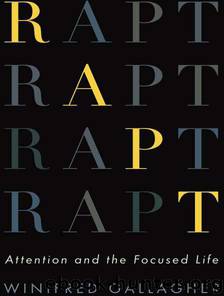Rapt: Attention and the Focused Life by Winifred Gallagher

Author:Winifred Gallagher [Gallagher, Winifred]
Language: eng
Format: epub, mobi
Tags: Non-Fiction, Retail, Sociology, Psychology
ISBN: 1594202109
Publisher: Penguin USA, Inc.
Published: 2009-04-15T15:00:00+00:00
LIKE FOCUSING TOO much on the opinions of your remembering self, overlooking the effects of adaptation—the process of becoming used to a situation—can obstruct wise decisions about how to live. As Kahneman says, “when planning for the future, we don’t consider that we will stop paying attention to a thing.”
The tendency to stop focusing on a particular event or experience over time, no matter how wonderful or awful, helps explain why the differences in well-being between groups of people in very different circumstances tend to be surprisingly small—sometimes astoundingly so. The classic examples are paraplegics and lottery winners, who respectively aren’t nearly as miserable or happy as you’d think. “That’s where attention comes in,” says Kahneman. “People think that if they win the lottery, they’ll be happy forever. Of course, they will not. For a while, they are happy because of the novelty, and because they think about winning all the time. Then they adapt and stop paying attention to it.” Similarly, he says, “Everyone is surprised by how happy paraplegics can be, but they are not paraplegic full-time. They do other things. They enjoy their meals, their friends, the newspaper. It has to do with the allocation of attention.”
Like couples who’ve just fallen in love, professionals starting a career, or children who go to camp for the first time, paraplegics and lottery winners initially pay a lot of attention to their new situation. Then, like everybody else, they get used to it and shift their focus to the next big thing. Their seemingly blasé attitude surprises us, because when we imagine ourselves in their place, we focus on how we’d feel at the moment of becoming paralyzed or wildly rich, when such an event utterly monopolizes one’s focus. We forget that we, too, would get used to wealth, a wheelchair, and most other things under the sun, then turn our attention elsewhere.
This attentional myopia is especially problematic when you’re trying to make important decisions about the future. Overlooking the fact that a romance’s honeymoon novelty must fade, an older man leaves a seemingly comfortable union of many years for a young “trophy wife,” only to find that he still faces the demands of marriage and misses the easy family life he shared with his first spouse. An urban couple decides that because they enjoy their country weekends so much, they should move to their rural hamlet for good, then later realize that on a full-time basis, they had rapidly adapted to and outgrown its limited resources. Offering a dizzying reconfiguration of the way we usually think, Kahneman says, “When you anticipate something, what you anticipate is memory more than experience.”
Forgetting that you’ll eventually stop paying attention to a new thing can skew not just big decisions about the future, but also the small ones that quietly but profoundly affect your present well-being. These “comforts,” as distinguished from “pleasures” by the late Stanford economist Tibor Scitovsky, are in fact “pleasures that you’ve stopped paying attention to,” says Kahneman. “The difference between them is clearly one of attention.
Download
Rapt: Attention and the Focused Life by Winifred Gallagher.mobi
This site does not store any files on its server. We only index and link to content provided by other sites. Please contact the content providers to delete copyright contents if any and email us, we'll remove relevant links or contents immediately.
Rewire Your Anxious Brain by Catherine M. Pittman(18638)
Talking to Strangers by Malcolm Gladwell(13342)
The Art of Thinking Clearly by Rolf Dobelli(10443)
Mindhunter: Inside the FBI's Elite Serial Crime Unit by John E. Douglas & Mark Olshaker(9313)
Becoming Supernatural by Dr. Joe Dispenza(8196)
Change Your Questions, Change Your Life by Marilee Adams(7753)
Nudge - Improving Decisions about Health, Wealth, and Happiness by Thaler Sunstein(7689)
The Road Less Traveled by M. Scott Peck(7592)
The Lost Art of Listening by Michael P. Nichols(7487)
Mastermind: How to Think Like Sherlock Holmes by Maria Konnikova(7313)
Enlightenment Now: The Case for Reason, Science, Humanism, and Progress by Steven Pinker(7305)
Win Bigly by Scott Adams(7183)
The Way of Zen by Alan W. Watts(6594)
Daring Greatly by Brene Brown(6501)
Big Magic: Creative Living Beyond Fear by Elizabeth Gilbert(5753)
Grit by Angela Duckworth(5598)
Ego Is the Enemy by Ryan Holiday(5412)
Men In Love by Nancy Friday(5231)
The Laws of Human Nature by Robert Greene(5166)
